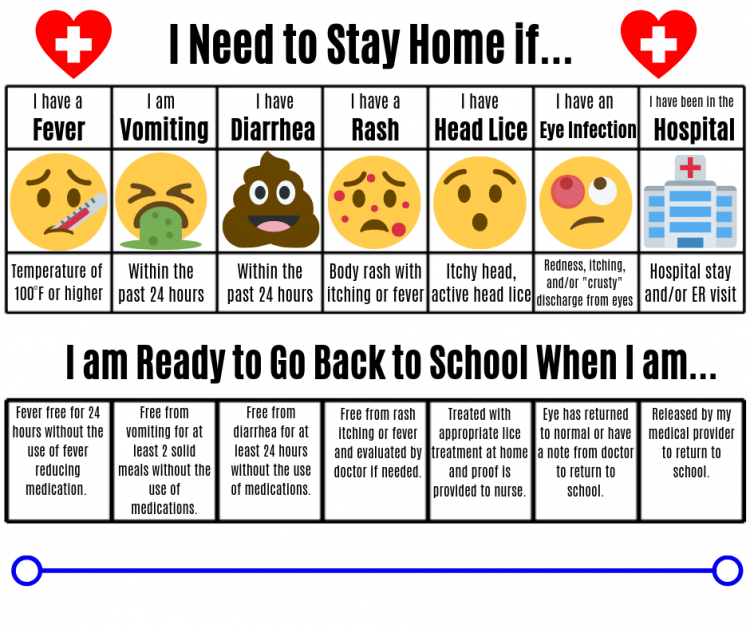WHEN TO KEEP A SICK CHILD/CHILDREN HOME FROM SCHOOL
Deciding when to keep a sick child home from school is not always easy. It’s important for children to attend school and for some parents, staying home means missing work. But when a child is truly sick, they need to stay home in the care of an adult to get well and prevent spreading illness to others.
If you are dealing with a specific illness, we have printouts with more detailed information we can send to you. But hopefully these general guidelines will help you decide if you should keep your child home from school.

COMMON COLD
a contagious upper respiratory infection caused by cold viruses. Symptoms can last 7-14 days. A child with no fever, mild symptoms and otherwise feeling well may be fine at school.
Need to stay home? A deep or uncontrollable coughing or significant lack of energy belongs at home even without a fever. See additional information on fever, sore throat and flu.
COUGH
a mild hacking cough often starts after the first few days of a common cold. A child with mild symptoms, no fever and otherwise feeling well may be fine at school.
Need to stay home? Uncontrollable coughing even without a fever. Cough and fever child must stay home for at least 24 hours after they no longer have a fever or signs of a fever, without the use of fever reducing medicine.
DIARRHEA/VOMITING
Need to stay home? Child should be kept home and should return to school only after being symptom free for 24 hours.
EAR ACHE
Consult a medical provider for earaches. Ear infections may require medical treatment.
Need to stay home? Child should stay home until pain free.
FEVER
a common symptom of viral and bacterial infection. Child is likely to be contagious to others when they have a fever. If there is no thermometer, feel their skin with your hand-if it is much warmer than usual child probably has a fever. Please do not give your child fever reducing medicine and then send them to school. The medicine will wear off, the fever will probably return and you’d need to pick them up anyway.
Need to stay home? Any child with a temp of 100°F or higher should not attend school and should not return until they have been fever free for 24 hours after they no longer have a fever or signs of a fever, without the use of fever reducing medicine.
FLU (INFLUENZA)
a highly contagious respiratory illness caused by flu viruses and can cause mild to severe illness. Child can be contagious up to one week after symptoms appear. Possible symptoms can include a combination of fever, cough, muscle ache, headache, tired, weak, vomiting or diarrhea. To help decrease the spread of regular seasonal flu does child….
Need to stay home? A child with flu-like illness (fever & cough) must stay home from school for at least 24 hours after they no longer have a fever or signs of a fever, without use of fever-reducing medicines. A fever is defined as a temp of 100°F or higher. If symptoms occur while at school, the student must be picked up as soon as possible.
FREQUENT/RECURRING SYMPTOMS
sometimes children pretend to exaggerate illness in order to stay home. However, frequent complaints of tummy aches, headaches and other symptoms may be a physical sign of emotional stress-a common experience even in children, or they may be symptoms of an illness. Consult a medical provider to evaluate recurring symptoms. Share your concerns with school staff.
HEADACHES
if the only complaint is a mild headache, usually the child does not need to stay home from school. Frequent or severe headaches should be evaluated by a medical provider, including a vision exam if needed.
Need to stay home? A child with a significant headache belongs at home until feeling better.
HEAD LICE
are tiny insects that live only on human scalps and hair. Look for: crawling lice in hair, usually there aren’t very many; white eggs (nits) glued to the hair, often found behind the ears and at back of neck. If your child is infested with lice, it will take 7-10 days from when the eggs are laid until they hatch. Treat child for head lice and check head to remove nits daily. The most important step for getting rid of lice is careful, daily removal of nits for two weeks. It takes at least 2 weeks to get rid of lice. If all nits within ½” of the scalp are not removed, some may hatch and your child will be infested again.
Need to stay home? Yes, until first treatment is completed and no live lice are seen. Nits are NOT considered live lice.
IMPETIGO
a contagious bacterial skin infection that usually begins with small fluid filled blisters that cause a honey colored crust on skin after bursting. It’s important to have symptoms evaluated by a medical provider because untreated infection can lead to serious complications. 24 hours after starting antibiotics, impetigo is no longer contagious.
Need to stay home? Students may attend school if drainage can be effectively kept covered and is not extensive.
PINK EYE (CONJUNCTIVITIS)
a common infectious disease of one or both eyes caused by several types of bacteria and viruses. The eye typically appears very red and feels irritated. There may be drainage of mucous and pus or clear liquid. Prescription medication may be needed to treat bacterial infection. Virus caused pink eye will not need antibiotic treatment.
Need to stay home? A child with the above symptoms should be kept at home until evaluated by a medical provider and return to school with or without treatment depending on the diagnosis.
RASHES
may be one of the first signs of a contagious childhood illness such as chickenpox. Rashes may cover the entire body or be in only one area and are most contagious in the early stages.
Need to stay home? Do not send a child with a rash to school until a medical provider has said it is safe to do so-especially with additional symptoms like itching, fever or appearing ill.
SORE THROAT
a child with a mild sore throat, no fever or otherwise feeling well may be fine to attend school.
Need to stay home? Keep child home and contact a medical provider for a severe sore throat and if white spots are seen in the back of the throat, with or without a fever.
STREP THROAT
a significantly sore throat could be strep throat, a contagious illness. Other symptoms may include fever, white spots in the back of the throat, headache and upset stomach. Untreated strep throat can lead to serious complications.
Need to stay home? Keep your child home with the above symptoms and contact a medical provider. A child diagnosed with strep throat is no longer infectious and can return to school 24 hours after antibiotic treatment has been started.
STOMACH PAIN
Need to stay home? Consult a medical provider and do not send a child to school with a stomachache that is persistent or severe enough to limit activity. If vomiting or diarrhea occurs, keep the child home until symptom free for 24 hours.
